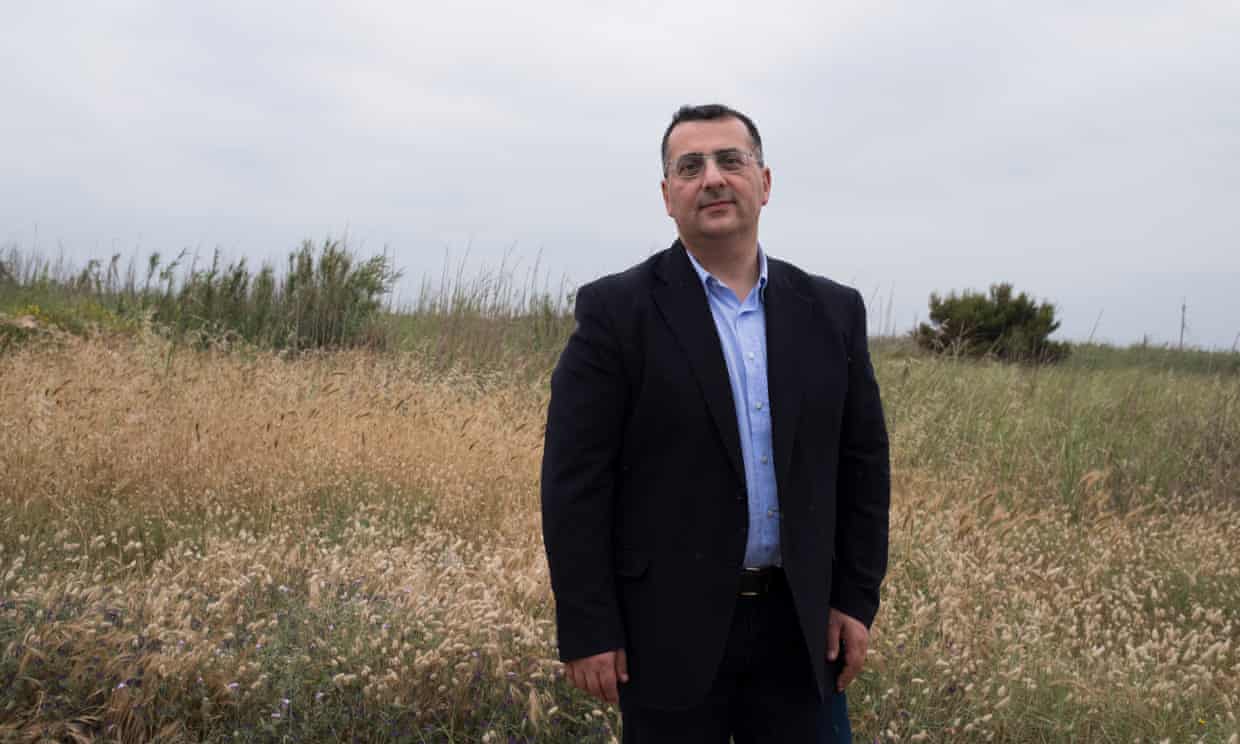The Sicilian banker who left the City to fight the mafia
Before the mafia shot up his office in a remote village on the western coast of Sicily, Gaspare Giacalone, 48, had been a respected manager at the European Bank of Reconstruction and Development in the City of London, managing investments worth billions.
But when he left his job in 2012 to run for mayor of Petrosino, his hometown, and take on the local godfathers, he knew he was swapping his eighth floor office in a grand building near Liverpool Street station for a life far more dangerous.
Set in a verdant landscape of olive groves and vineyards, Petrosino – population 8,000 – is in the heart of the territory controlled by Matteo Messina Denaro, Cosa Nostra’s boss of bosses of and one of the world’s most wanted fugitives.
Giacalone’s battles against illegal building and waste disposal controlled by criminal organisations as mayor have made him a thorn in the side of the mafia. If you ask Gaspare if he’s aware of the risks, he smiles and throws open his arms: “It’s a dirty job,” he says, “but someone’s got to do it”.

The son of a farming family, Giacalone arrived in London in 1996 and found work as a financial analyst thanks to an advertisement in the Guardian. He worked with Deutsche Bank and the Royal Bank of Scotland before taking up his post with the EBRD in 2008, where his annual base salary was more than £160,000.
His move into politics began two years earlier when he founded a leftist radical association, Radio Londra, whose members included over 250 young Italian emigrants, some of whom had left southern Italy for the UK because their families did not accept their homosexuality. Giacalone helped them to integrate into British society and to find work. He began to realise that his calling was not in the world of finance.
The catalyst came in 2011, when he learned on a trip back home that developers linked by magistrates to the local mafia were involved in plans to take possession of his beloved beach in Petrosino, covering it with 9,000 square metres of cement to build a hotel a few steps from the shore.
“I couldn’t stand for it and when I returned to London I began to plan my candidacy for mayor of Petrosino,” said Giacalone.
He gave up his financier’s life and returned to Sicily after 17 years in the UK. In May 2012, with support from a coalition of parties of the radical left and the communist party, he won the election and began to wage his war against the mafia.
The bosses’ reaction was immediate: each week an anonymous letter arrived in his office. “I’ve collected over 300 in five years,” he said. “The letters contained death threats. They said that if I tried to stop them, they’d kill me”. But Giacalone was not dissuaded, sending complaints to the authorities against illegal building and the private management of waste disposal, a business with strong mafia involvement.
He learned that the bosses planted bugs in his office to track his movements. On 6 October 2016 the windows of his office were broken and the walls riddled with bullets. And one morning, instead of the usual letter, his office received a package containing five bullets.
The Carabinieri inspected Giacalone’s home and he was forced to transform it into a fortress with dozens of closed circuit cameras. Despite the threats, his battles began to achieve results: the district attorney’s office in Marsala seized the buildings that the developers had built along the beachfront, and the regional government entrusted waste management to public agencies.
Giacalone was re-elected mayor of Petrosino in 2017 with more than 60% of the vote and last week Petrosino was ranked third on a list of Italy’s “most virtuous” cities.
Don’t ask him if he misses his eighth-floor office with views of the London skyline and his designer ties or six-figure salary, because no billion-euro financial investment has given Giacalone as much satisfaction as defeating the godfathers.
“I hold London in my heart,” he says. “I learned from the English the right thing to do. But from the Sicilians I learned how to struggle to achieve it”.
Fonte: The Guardian (qui il link originale). Testo di Lorenzo Tondo, foto di Francesco Bellina.









































